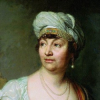Madame de Stael

Madame de Stael
Anne Louise Germaine de Staël-Holstein, commonly known as Madame de Staël, was a French woman of letters of Swiss origin whose lifetime overlapped with the events of the French Revolution and the Napoleonic era. She was one of Napoleon's principal opponents. Celebrated for her conversational eloquence, she participated actively in the political and intellectual life of her times. Her works, both critical and fictional, made their mark on the history of European Romanticism...
NationalityFrench
ProfessionWriter
Date of Birth22 April 1766
CountryFrance
Madame de Stael quotes about
The mystery of existence is the connection between our faults and our misfortunes.
Who understands much, forgives much.
The more I see of man, the more I like dogs.
To be totally understanding makes one very indulgent.
It is obvious that the most despotic forms of social organization would be suitable for inert men who are satisfied with the situation fate has placed them in, and that the most abstract form of democratic theory would be practicable among sages guided only by their reason. The only problem is to what degree it is possible to excite or to contain the passions without endangering public happiness.
We understand death for the first time when he puts his hand upon one whom we love
The face of a woman, whatever be the force or extent of her mind, whatever be the importance of the object she pursues, is always an obstacle or a reason in the story of her life.
The most careful reasoning characters are very often the most easily abashed.
I learn life from the poets.
Music revives the recollections it would appease.
Courage of soul is necessary for the triumphs of genius.
The soul is a fire that darts its rays through all the senses; it is in this fire that existence consists; all the observations and all the efforts of philosophers ought to turn towards this Me, the centre and moving power of our sentiments and our ideas.
I believe that happiness consists in having a destiny in keeping with our abilities. Our desires are things of the moment, often harmful even to ourselves; but our abilities are permanent, and their demands never cease.
And all the bustle of departure - sometimes sad, sometimes intoxicating - just as fear or hope may be inspired by the new chances of coming destiny.